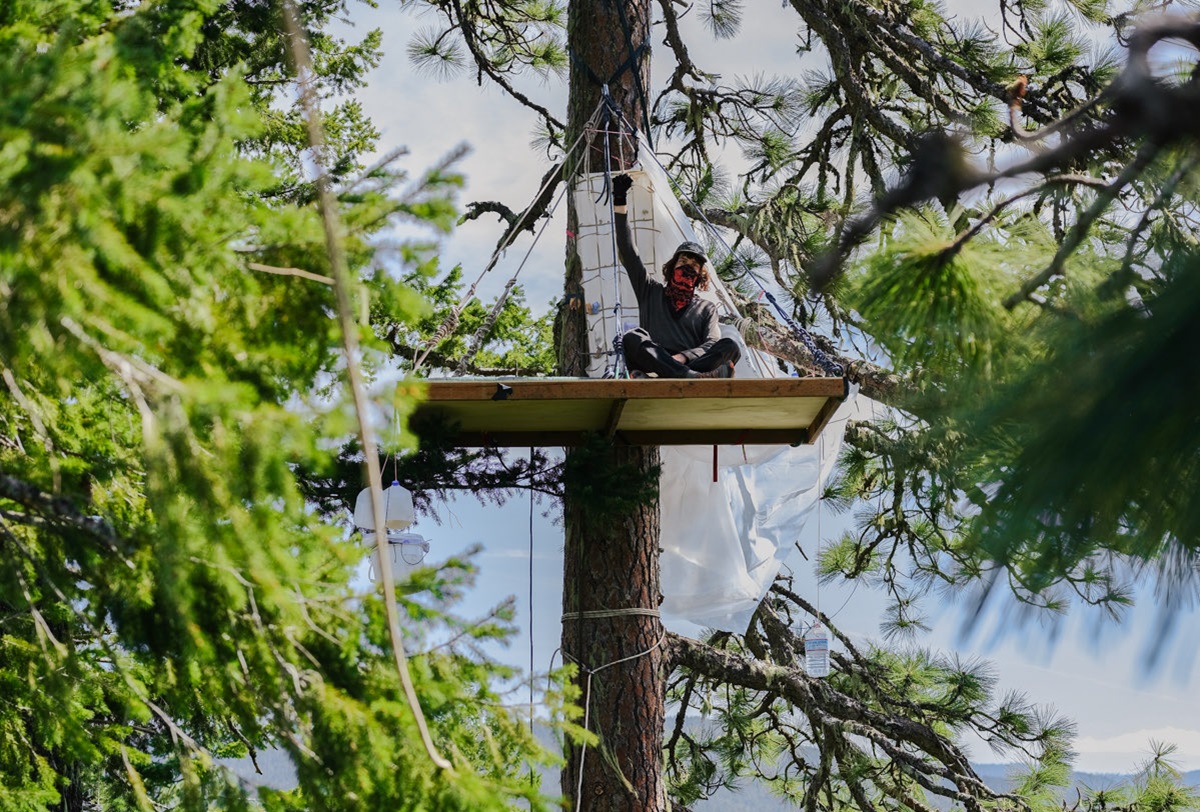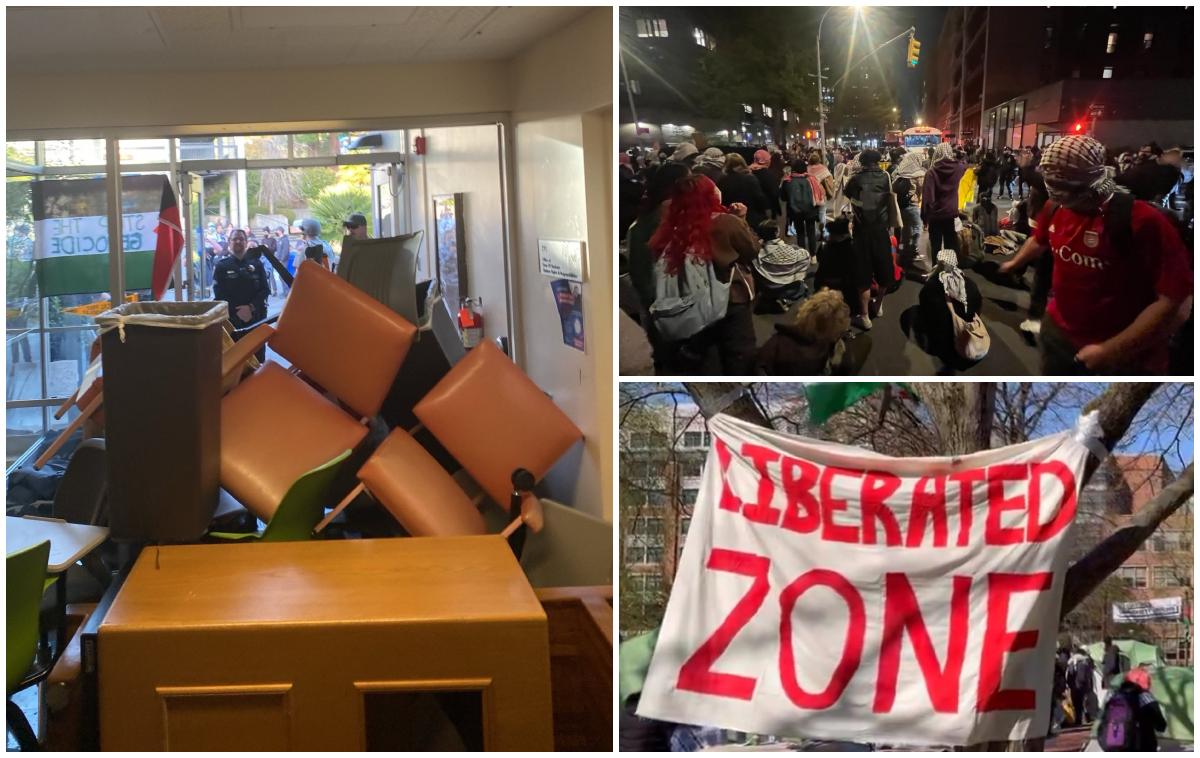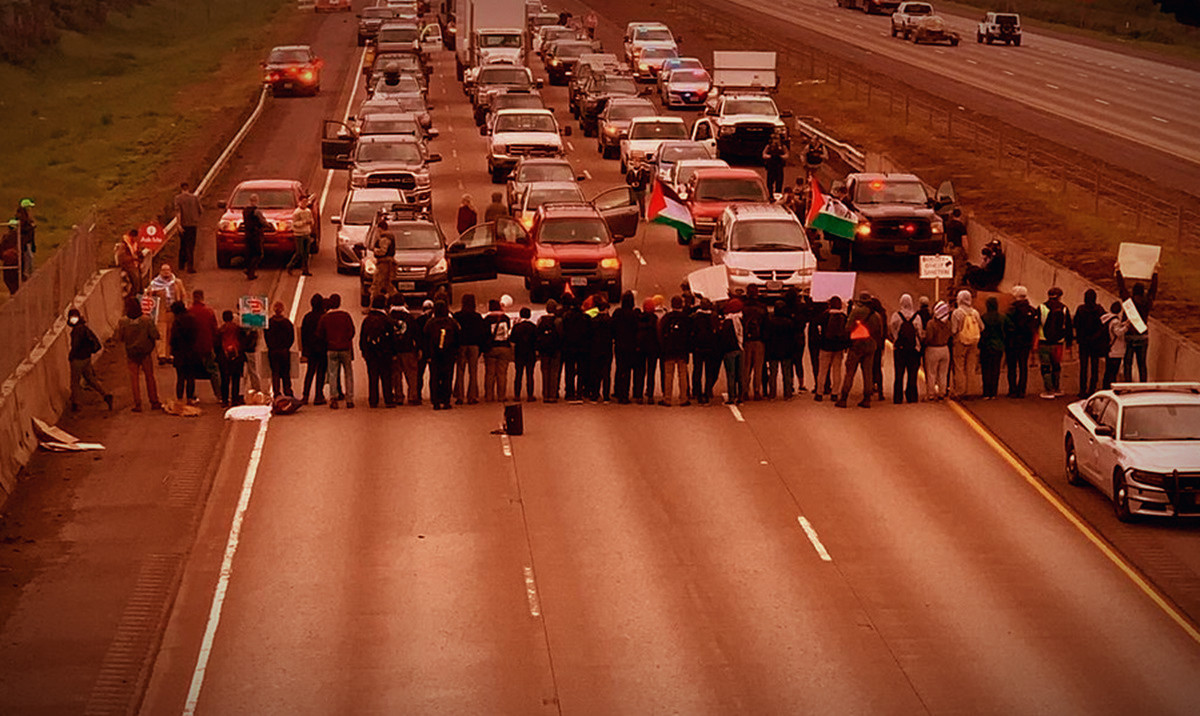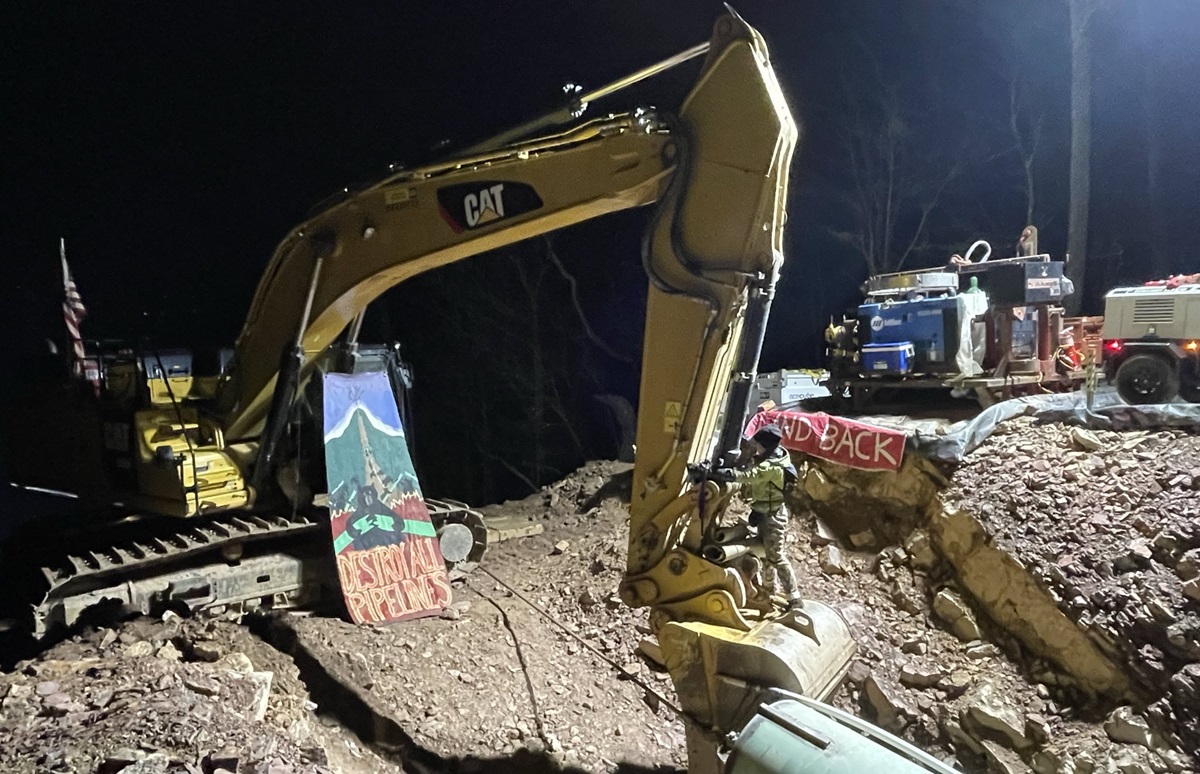Filed under: Action, Canada, Development, Environment, Indigenous, Land, Repression, Solidarity, The State
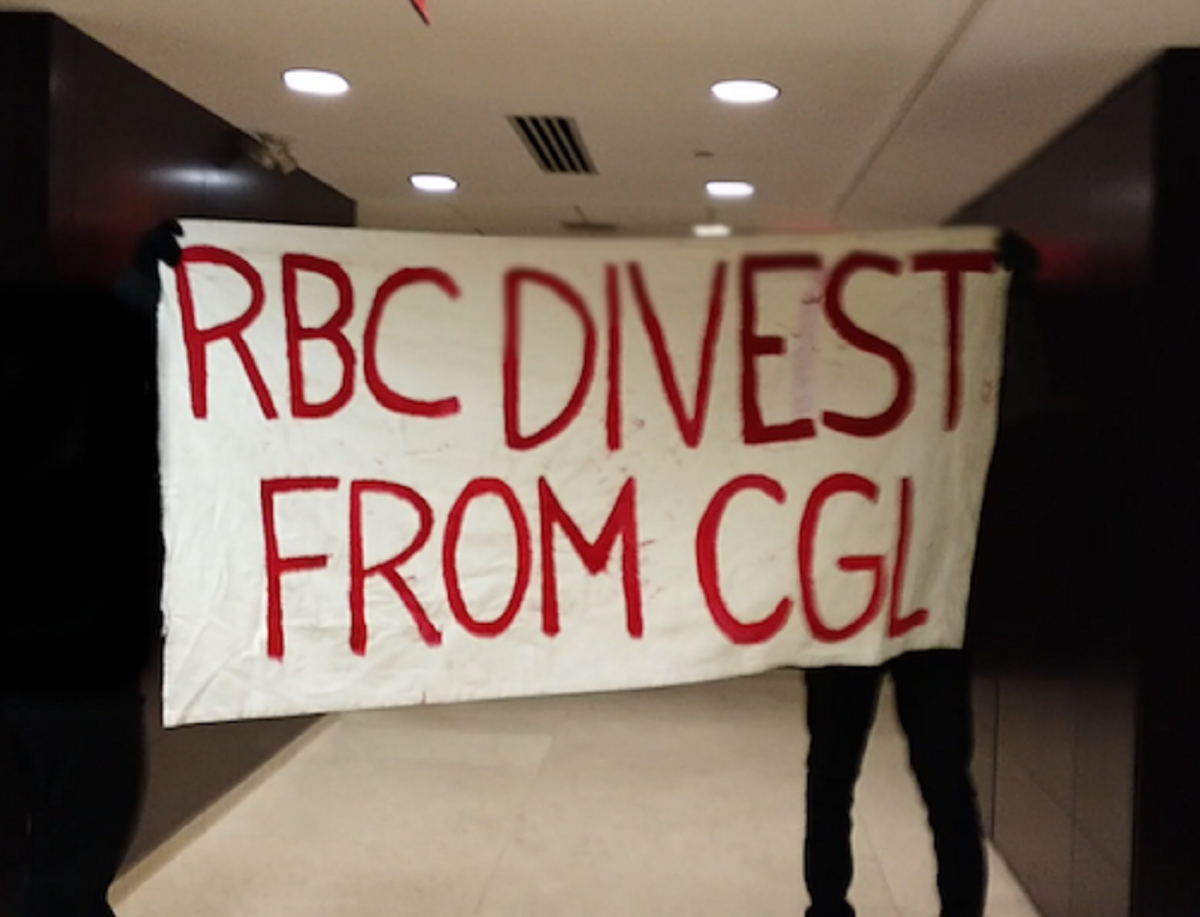
Pressure continues to mount against Coastal GasLink (CGL) to kill a massive pipeline project on Wet’suwet’en territory. Last week, hereditary chiefs traveled to attend meetings with the Royal Bank of Canada (RBC), only to be told that they were cancelled to a “COVID-19” outbreak.
“This doesn’t seem like a coincidence,” said Sleydo’, Spokesperson for the Gidimt’en Checkpointwho traveled from the Yintah, the Wet’suwet’en traditional territory, to attend the meeting. “RBC has a track record of ignoring our concerns, and the criticism of shareholders and customers. It seems like they don’t want to answer for their financing of the rights-violating Coastal GasLink fracked gas pipeline and to face us in person.”
Despite the meeting pivoting to a virtual event, a delegation of Wet’suwet’en Hereditary Chiefs will proceed with an 11:00 am EDT march and rally from the Metro Convention Centre, original site of the in-person meeting, to RBC headquarters at 200 Bay Street. The action outside RBC headquarters will happen in conjunction with more than 30 other events planned at RBC branches and locations across Canada.
In another statement, Gidimt’en Checkpoint Spokesperson Sleydo’ stated:
Our sacred headwaters, the Wedzin Kwa river, is the lifeline for our people. By financing Coastal GasLink, CNB’s parent company RBC is putting us profoundly at risk. The gas pipeline violates our hereditary title, and has led to years of RCMP violence and harassment of peaceful Indigenous land defenders, and the forced removal of Wet’suwet’en peoples from our territory. We’ve been crystal clear: RBC must divest from this toxic project, which threatens Wet’suwet’en land, air and water, and steamrolls Indigenous rights.
The pipeline has been denounced by a variety of environmental groups and celebrities like Mark Ruffalo have recently been pushing a divestment campaign against the project.
According to CBC:
That project has been described by the Canadian Centre for Policy Alternatives as a “carbon bomb” that is incompatible with the province’s carbon reduction goals.
Despite widespread opposition from the Wet’suwet’en hereditary chiefs, indigenous, anarchist, and environmental groups, the pipeline has the backing of the Canadian State and various band councils; entities which were created by the federal Canadian government, and many of whom have a financial stake in the project. Newly released reports also show how committed the so-called Canadian state is to smashing any resistance to the project, even in the face of ongoing natural disasters, such as massive flooding:
Wet’suwet’en Hereditary Chief Na’Moks says it’s “unsettling” to see how easily the B.C. RCMP’s secretive Community-Industry Response Group (C-IRG) obtains cash and cops from the provincial government, even in the midst of last year’s historic floods.
It reveals an “industry driven” approach to policing, said Na’Moks, also known as John Ridsdale, in a phone interview. “Clearly it shows who’s directing it, which is industry along with the elected officials.”
He was reacting to newly released documents that show a senior Mountie with the C-IRG pressed public safety officials to hastily greenlight a tactical operation on Wet’suwet’en territory after cataclysmic extreme weather started devastating parts of the province.
“That man-power could’ve been used in the flooding that happened in the lower mainland. That man-power should’ve been used there,” said Na’Moks. “Instead they put taxpayer money out here to protect the pipeline that, to us, is illegal. We’ve evicted them. We’ve never agreed to it.”
This ongoing police action isn’t cheap either:
The B.C. RCMP’s industry response squad spent almost $1 million protecting the Coastal GasLink pipeline in less than two months as construction on Wet’suwet’en territory entered final phases last winter.
Operations included a two-day November raid and planning for an aborted follow-up incursion to seize a pipeline drill site that activists reoccupied on Dec. 19, 2021, internal police communications show.
And while massive amounts of money is being spent on police protection for the pipeline, the federal government has also been busy surveilling leading Indigenous organizers, out of fear that “links between Mohawk activists and Wet’suwet’en hereditary chiefs could spark a repeat of 2020’s countrywide solidarity blockades, an unclassified internal memo shows.”
Coastal Gaslink pipeline owned by TC Energy came under attack the other night with over a million dollars worth of sabotage. #coastalgaslink pic.twitter.com/xZJVbdpu2H
— Kanahus Manuel (@KanahusFreedom) February 18, 2022
Meanwhile, Canadian police continue to investigate a “mob” of mask-wearing individuals which in February, carried out a brazen attack on Coastal GasLink property, causing “millions” of dollars in damage, by using “grinders to cut locks to access the construction site, vandalizing heavy equipment and cutting hydraulic and fuel lines.” So far, police have made no arrests, and sabotage actions against the CGL project continue across so-called Canada. Posting to the counter information website North-Shore Counter-Info, anarchists reported continued sabotage of RBC bank windows:
This week across southern ontario and quebec, we’ve lost count on how many RBC branches were targeted (we estimate 10+) for disruption and attack. So-called toronto, hamilton, montreal… friends in places as small as orillia and as distant as nanaimo. These actions respond to a need to target investors in the Coastal Gaslink pipeline project – which is currently behind schedule thanks to the direct attack that took place in february as well as the successful campaigns to block the project thus far lead by Gidimt’en Clan – but is still rapidly being constructed on unceded Wet’suwet’en territory.
RBC is one of its largest financial backers, and in the past week and preceding months, has been the subject of pressure tactics ranging from direct action interfering with bank branches, to pushing elites/clients to pull their money out of RBC accounts, to organizing to disrupt RBC’s Annual General Meeting in Toronto. The message is clear: the Royal Bank of Canada needs to divest from CGL immediately.
In hamilton, where we’re writing from, bank branches were vandalized, had their locks glued, and ATMs damaged. We chose these methods to directly interfere with the operations of the bank, hurt them financially and in their public image, and to contribute to the spread of easily-replicable, anonymous actions.
RBC was the central target this week, but they are not alone in complicity. We can also set our sights on other big banks, TC Energy, many related contractors and developers, the RCMP, and the State of so-called Canada.
This is only going to escalate. CGL, and their financial allies like RBC, perpetuate the situation by continuing their exploitative projects and violent attacks on Wet’suwet’en territory. The Wedzin Kwa remains under the looming threat of being destroyed via drill. Elders, matriarchs, supporters, comrades, and land defenders face daily assault. We all need to prepare for more, to respond with more boldness, to do more damage. If they push, then we then will push back, but harder. With only a bit of planning and courage, we can act in ways that feed our spirits and keep the fight alive. Stay safe, and we look forward to seeing your work out there in the days to come.
Meanwhile an anonymous post to Montreal Counter-Info stated:
In the early afternoon, a small group of anarchists snuck into the RBC offices at Place Ville-Marie. Armed with flyers, stickers and spray paint cans, they left a message for the bank: DIVEST FROM CGL. Since the Fall of 2021, the Wet’suwet’en have been actively campaigning for RBC to stop funding the destruction of their land, but RBC continues to ignore them.
As long as RBC is funding pipeline projects, they will find us in their way.
– some fucking angry anarchists
A larger statement on the need for fostering long-term anti-colonial solidarity was also posted to Montreal Counter-Info, which read:
Imminent Threat: Coastal Gaslink (CGL) is set to drill under the Wedzin Kwa this Spring 2022. The people, land, language and culture of Wet’suwet’en as well as the animals residing on these territories are facing annihilation of their lifeways. For those who have heard the call to action, this upcoming year is crucial to the future of Wet’suwet’en self-determination and sovereignty.
Solidarity actions keep the Gidimt’en fight visible and the people on the frontlines safer from police repression and CGL harassment. Just in the past month alone, the RCMP made 54 visits to Gidimt’en Checkpoint, waking elders at all hours of the night and threatening arrest. These ongoing acts of intimidation and police repression are a part of a broader strategy by the Canadian state to use the legal and judicial systems to continue to deny Wet’suwet’en sovereignty, despite the fact that the Canadian judicial system recognized Wet’suwet’en sovereignty in the Delgamuukw v British Columbia decision.
Longterm Struggle: Commitment is a long breath that is constantly threatened by exhaustion. This struggle against CGL takes on many dimensions: decolonial, environmental, anti-capitalist and feminist. The numerous “man camps” invading the Yintah intensifies and facilitates men’s ability to kidnap, rape and murder Indigenous women, girls and two-spirited individuals (see the Final Report by the National Inquiry into Missing and Murdered Indigenous Women and Girls, p. 593). As long as CGL and the RCMP remain on the territory so too do the heightened levels of colonial gendered violence.
Our vehicle gate was broken upon @BCRCMP entry @ 1140 this morning. 6 officers trespassed into camp, offering no reason beyond "checking in", and now we have no privacy from the 24/7 #cgl security parked outside.@jjhorgan enough is enough.#rcmpofftheyintah#wetsuwetenstrong pic.twitter.com/NIPAGYPF2x
— Gidimt’en Checkpoint (@Gidimten) April 12, 2022
We continue to support Gidimt’en Checkpoint’s fight against Coastal GasLink and extractive companies because the struggle towards Indigenous self-determination is a long, arduous struggle. Solidarity organizing is most effective when it is consistent and strategic. Our ongoing efforts contributes to the strength and `visibility of their fight for self-determination, sovereignty, and freedom.
They cancelled in person at the last minute and then denied two Wet'suwet'en speakers asking their questions online, including Sleydo'. They will never effectively silence us. Their true colours showed to their shareholders and the world. #RBCisKillingMe #AllOutForWedzinKwa pic.twitter.com/CH1pPNAsNO
— Gidimt’en Checkpoint (@Gidimten) April 11, 2022
Imagine the strength and capacity of solidarity work if people engaging in this kind of organizing had personal and collective stakes in the game? For instance, there are many Indigenous people fighting across Turtle Island to be free from the settler state and to be free to govern themselves as they deem in accordance to their own ways. There are also many non-Indigenous people fighting to be as free as they can from the institutionalization and regulation of their bodies, relationships, and communities. These varying experiences and histories of struggle provide a basis for profound points of connection.
Imagination is an asset when it facilitates various ways to make this fight visible. Adapt the tactics and organizing strategies to your capacities and resources. Most importantly, act. It’s time.
For updates, follow Gidimt’en Checkpoint on Twitter and Yintaha Access.


